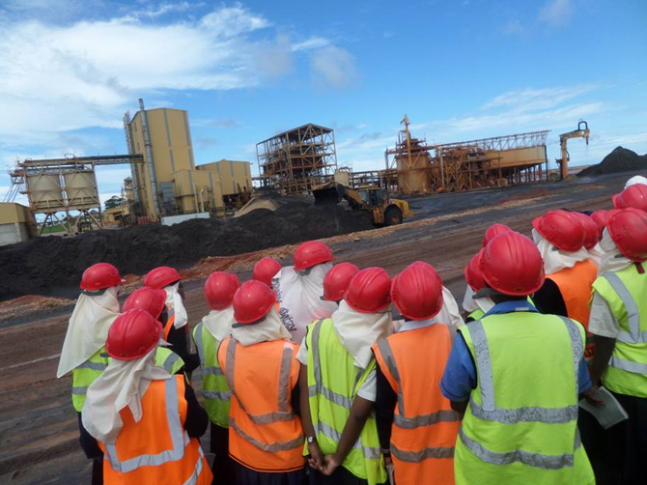Meeting Kenyan Girls’ Thirst for Groundwater Knowledge Through ‘Water Clubs’
Published on by Sean Furey, Water & Sanitation Specialist at Skat Consulting in Academic
Red dye spreading through a model ‘aquifer’ helps girls from Kingwede School in Kwale County, Kenya understand how pollutants travel in groundwater. The students are part of a school water club supported by the Gro for GooD project in partnership with mining company Base Titanium Ltd.
by Nancy Gladstone and Saskia Nowicki, Gro for GooD project, November 2017
Maji (water in Swahili) clubs at 3 secondary schools within the Gro for GooD study area are proving to be an effective outreach mechanism for the groundwater research project. Almost 100 students are involved and over half of them are girls.
The focus is on learning through activities, which have included hands-on sessions about groundwater recharge, storage and pollution using aquifer kits; practical experiments using water quality tests to demonstrate simple water filters and safe water storage; installing and gathering data from rain gauges; and field trips to see industrial water use and borehole drilling.
We asked the girls at Kingwede Maji to write a short paragraph on why they signed up to the club. Their responses indicated just how aware they are of the problems associated with inadequate water management – the risk of disease, time-consuming treks to waterpoints, seasonal water scarcity — and just how motivated they are to find solutions.

Students at Mivumoni School collecting samples for water quality testing during a club activity led by Geofrey Wekesa (teacher and researcher, also pictured above)
“Where I live we have rivers and also other sources of water. Our water get polluted especially the river water mainly from animal waste. I am in this club so that I can know how to treat the water so that it can be safe for use.” Munirah R.
“I am so eager to know how that water from the river may reach nearer where we can easily get it. Reason being that from our homes to the river is quite a long distance and it usually takes us almost a whole day looking for the water. Which is time wasting and also tiresome.” Jackline K.
“The reason as to why I am interested in this water project is to know why some of the areas in Kwale County and all other parts in our country have scarce water supply? And what causes this? And what are the things which we can do to avoid this?” Halimah A.
The clubs are now working on group projects with remote support (via WhatsApp groups!) from staff and students at the University of Oxford. Meanwhile, Gro for GooD researchers and the clubs’ champion teachers are preparing material for a resource package that will capture the learning from the programme. We are also working on developing partnerships and networks for wider dissemination of the resources in Kenya.

Students from Kingwede Girls School learning about industrial water use on a trip to Base Titanium mine. A major goal of the initiative is showcasing career options and pathways in environmental science and management.
It is inspiring how much these students want to deepen and share their understanding of water. Whether they decide to pursue careers in water management or simply become better-informed members of groundwater-reliant communities, the knowledge they gain through the water clubs will help them have a positive impact.
“When the club was introduced to my school I saw it as a big opportunity and decided to join it because I knew I would get ideas that would help back at home. My hope is that I will learn several ways to purify water which will bring an impact back to my home county.” Fatma M.
Weblinks:
More: University of Oxford
Media
Taxonomy
- Irrigation
- Education & Research
- Research
- Groundwater
- Water Supply
- Water Management
- Water Resources Management
- Public schools
- Water Sanitation & Hygiene (WASH)
3 Comments
-
Sounds wonderful! When you are interested in training infection prevention techniques please let me know. dr.will@henrythehand.org
-
Thank you for this blog post. It's a reminder of the power of schools, youth, and girls to solve local water management issues. I would be interested to learn more about this partnership the mining company Base Titanium Ltd.
-
Wow! Good news. This is happening in Kenya. I need to hook up with them